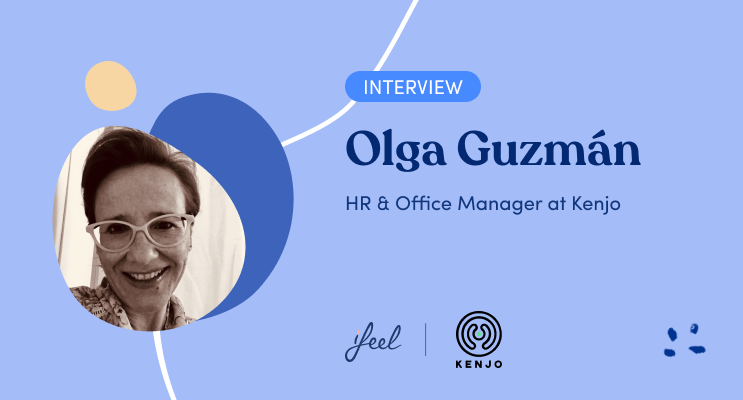Olga Guzmán, HR & Office Manager at Kenjo
My name is Olga Guzmán, and I am currently the HR & Office Manager at Kenjo. My professional career has always been related to the HR field, from a broad perspective and sometimes more focused on development and training, as well as recruitment and selection.
I like scary movies, fashion, and music. Besides, I love my job because it involves dealing with people, which I have always enjoyed. As an anecdote, my first job was as a private tutor for children, and I have to say that I was not bad at all hehe.
Tell us, Olga: What exactly is Kenjo?
Kenjo is an all-in-one HR software for SMEs, designed to reduce the burden of HR administrative tasks, improve work culture and help develop talent in organizations.
Kenjo was founded in 2017 with just 15 employees and currently has more than 80 collaborators in different countries. Since its beginnings, Kenjo has had an international character as a company since its headquarters are in Berlin, but it also has an office in Madrid. It is also present in Switzerland, Austria, and Latin America, specifically in Mexico – where it has made its first hires – and other countries such as Nicaragua, Argentina, Colombia, Uruguay, and Costa Rica.
In addition, we have more than 500 clients from various industries. In this sense, one of Kenjo’s unique features is to support companies in all sectors, including those in the service, industrial and commercial sectors. For this, we have more than 12 functionalities for, among other aspects, vacation and absence management, recruitment, rotating shifts creation, workday clocking, or payroll management.
As Kenjo grew and, consequently, its number of employees, did you find it challenging to take care of their well-being?
When a company grows, the organization’s structure tends to become progressively more complex and to have more significant management challenges, including people. At Kenjo, since the beginning, we have carried out various actions aimed at caring for the well-being of all employees, although it is true that as the team has grown, these needs have evolved.
“We have realized that it is essential to carry out specific plans to guarantee this well-being and, within it, to frame different actions.”
For example, we carry out work environment surveys regularly and thanks to them we find out their level of satisfaction and their needs. Thanks to this, we have implemented a series of social benefits, free and unlimited psychological therapy for employees, a hybrid system of remote and on-site work, flexible working hours, continuous feedback sessions, and team-building events, among other aspects.

As a result, our eNPS (Employee Net Promoter Score) is around 8 out of 10 every month, and we have been awarded the ‘Great Place To Work’ recognition in both Spain and Germany.
Do you think that, as a start-up grows, you end up losing that personalized approach that allows you to be attentive to the care of each employee?
I believe that as a start-up grows, several challenges arise, and losing personalized care is undoubtedly one of the scenarios that can occur. However, in my opinion, it is not intrinsic to that growth and does not have to happen if the right measures are taken.

I think it is very convenient to be aware of what can happen to put the precise measures in place and implement a plan that adapts to the needs of each company and its size.
And in general, why not say it? It is a question of priorities. If the priority lies in people, the focus on time will be adjusted accordingly. Moreover, our software has a road map in place, making everything more manageable, and will continue to give us the time to focus on what is most important.
What measures have you implemented at Kenjo to make your team’s life easier?
A number of the measures we have implemented are some of the ones I mentioned above, such as the introduction of social benefits, therapy sessions for employees, or hybrid work systems, among others.
However, I would add that Kenjo’s platform is designed to facilitate not only HR managers’ day-to-day work but also employees’ day-to-day work, especially with aspects related to the company or labor regulations that also concern them.
For example, clocking in or requesting vacations and absences can be done digitally and from any device. They can also sign documents electronically and even remotely, save their pay slips and other documents in the cloud, and know which employees are absent or on vacation or when their colleagues’ birthdays and anniversaries are.
All this simplifies these tasks and means they do not have to waste time with tedious and routine administrative aspects. In addition, Kenjo’s interface is very intuitive, so employees can use it without prior technical knowledge. It is a tool that fosters an inclusive work environment.
Finally, we would like you to name three HR trends that you consider essential to fostering a positive employee experience.
It’s hard to mention just three trends! But I would say the following: work environment surveys, introduction to benefits, and feedback sessions.
“I believe that work environment surveys and questions in general that are asked anonymously are essential to know how employees are doing and what they need“
In other words, it should not be ‘one size fits all’ when creating employee experience plans. Instead, they should be adapted to specific needs.
Additionally, introducing tax-deductible social benefits is essential to incentivize employees and compensate them for their work beyond monetary remuneration.

Finally, feedback sessions between employees and team leaders are essential to creating a company culture that is open, honest, and willing to improve on both sides. For this reason, I believe these sessions must be truly bidirectional and should be held periodically, at least twice a year.
To conclude, I believe that building a good employee experience is a matter of empathy. That could be a word or a trend that should always be preserved. You must empathize with the one in front of you for any measure, initiative, etc. And, of course, make it useful in your context and not just something novel or something other start-ups are doing.



